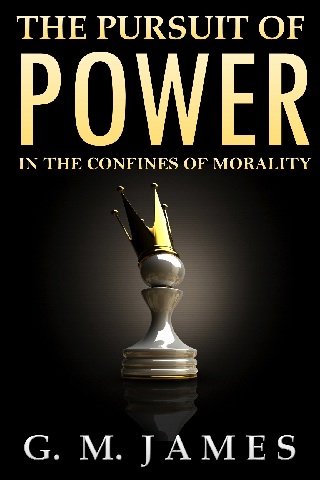
Description:
e x c e r p t
The Black Sheep
POWER OF NONCONFORMITY
Of all the many ways by which an individual can amass for himself far-reaching power and influence over men, none is greater or holds stronger than the unassuming yet immensely dynamic path of nonconformity. And in the absence of both military and financial might, the nonconformist carries with them tremendous potential to circumvent the ruling factions, be instituted as the new power and be immortalized in the minds of the people for generations to come. And no other path in life provides a greater sense of purpose and personal fulfillment than this. Look and see the world for what it is, and know that for all of mankind, the greatest are the non-conformist. Initially ridiculed or persecuted but eventually and inevitably followed and revered. But it all begins with an unsettling ideal, an ambition far beyond what the people believe to be practical and a willingness to throw oneself against the fabric of society.
World-famous and legendary writer Niccolo Machiavelli in his infamous classic The Prince talks about what he calls a new prince, who by his own ability emerges from among the people to re-write the rules and institute a new order. Machiavelli states that although it is not easy to acquire power in such a manner, it also holds true that after it has been acquired, it does not require much effort to keep it. Speaking of the examples that he gave he said:
“Those who by valorous ways become princes, like these men, acquire a principality with difficulty, but they keep it with ease.”
So how does it work?
Well, first, know that the conformer is scarcely remembered, and never revered. He does not provoke the awe and admiration that is reserved for those who fight against the system. Look around and you will see this to be true. Consider those who possess great skill and have become masters in their respective arenas. These captains of industry amass wealth and popularity, and may even obtain some form of power. They are celebrated for season but are eventually replaced by another who is smarter or stronger. And as quickly as they rise to fame they also fade from memory. Why? Because they conformed to a pre-established system and became masters of things that were already in existence. And existing things often retain the “gods” that created them, and only these “gods” retain ultimate power. The nonconformist however being the one that creates a new system, enjoys the luxury of being elevated to an immortal status of authority over the system that he created. And as this is true for all institutions within a society, it is also true for a society as a whole.
Now, let us consider the plight of two specific facets of persons. On one hand; the powers, and on the other; the people. The powers that be exist because the people have created them. And the powers that be are allowed to be because they represent the systems of belief and behavior that are glorified by the people. All societies have these systems to which everyone conforms, and the established powers that represent those systems must also conform to them. Now, for one who possesses neither physical nor financial prowess to seek power, one cannot conform to the existing system of belief and behavior. Why? Because that system already has its powers. And these established powers have long encompassed all forms of socio-economic muscle that would immediately rise up to crush and bury you if you attempt to simply replace them with yourself. It is for this reason that the non-conformist is priceless. Provided that his character exudes a few desirable qualities he will create from his nonconformity, whether consciously or not, a new system, that may often at first go unnoticed by the powers of the old system. And he will eventually and inevitably rally to himself a following of people, who being frustrated by the established system are seeking a new solution. And there will always be such people, for it is an inherent human characteristic to place blame for one’s problems on systems and circumstances rather than oneself. The exploitation of this weakness is where the power of the non-conformist lies. So without any kind of tangible strength, he steadily and inevitably renders the old powers worthless and ineffectual.
Julius Caesar, although having been already born into wealth and prestige, applied this principle in the latter part of his life. The moment that he decided to cross the Rubicon River with his army (which was considered an act of treason), he became a non-conformist. By doing what he did, he aggressively defied the old system in order to institute a new order of things. Some may say that there wasn’t anything special about Caesar’s rise to power, and that he simply took over the government by force. But it’s not as simple as that. His actions can be described as non-conformity because the people were on his side. He deliberately set about re-writing the rules in such a way that the people saw the old system as oppressive and saw his new system as a form of liberation. And what was the result? Supreme idealistic power over the Roman world. Had he chosen to follow the rules and returned to Rome without his army as ordered by the Senate, his name and all that he had done would have been forgotten by history. Yes, his life did come to a tragic end, and had he been more prudent regarding the minds of his fellow politicians he would have lasted longer. But the governing principle still stands true, that non-conformity has the potential to bring you immense power and legendary status. Even after he was murdered, the system could not simply revert back to the way it was, because Caesar’s power had already been immortalized. All the powerful people of Rome still could do nothing to remove what Caesar had done. His successor simply took his place, and his name; Caesar, was elevated into a title that became synonymous with the word ‘Emperor’; a legacy that lasted hundreds of years.
So, the whole of this principle can be summed up in this simple statement; you must go where no man has ever gone before.
Another way to understand the potency of the nonconformist’s potential for power, is to think of success as a mountain. Now consider that all of society is busy trying to reach the top of the same mountain and are stepping on each other’s heads to get there. But the nonconformist seeks out a new mountain; one that no one ever thought to climb. In so doing, he removes himself from the over-competitive status quo, and therefore finds it much easier to reach the top. When he does, he shines a beacon of light for all to see and draws them away from the old mountain to his new one. And although they may resume their constant struggle and competition, it does not affect the nonconformist, because he is already at the top. Seeking power by taking paths already laid by others before you, will only get you so far. And you will have countless enemies and competitors to lay snares for you along the way. By cutting your own path, you are able to push ahead with confidence leaving others behind fighting each other to keep up with you.
But this type of living isn’t easy, and in fact is one of the most difficult things for a human being to do. It requires you to stand alone and apart, to offend many and be labelled many undignified titles. Such socially abrasive tactics are not for the faint of heart. One might think that more direct approaches to seeking power and influence require the greater quantity of strength and courage, but the opposite is true. It takes a truly formidable kind of person to move in one direction while the whole world goes in the other. Nonconformity isn’t just about something that you do, it’s about what you are. It requires a specific kind of character, inherent traits in an individual that allows them to be a nonconformist. Non-conformity as a principle involves the constant effort to revolutionize, to cancel the authority of the old powers by proving their system to be either oppressive or unprogressive. You must be able to see opportunities where others don’t, and have the willingness and courage to venture into unchartered territories and unconquered lands. Power through nonconformity may not come swiftly, but it is without doubt the most sustainable method. For when it finally wins, its victory is almost always permanent.
“The object of life is not to be on the side of the majority, but to escape finding oneself in the ranks of the insane.”
- Marcus Aurelius, Meditations
The Servant
POWER OF SERVICE AND SACRIFICE
“And he makes a great mistake, in my opinion at least, who supposes that authority is firmer or better established when it is founded by force than that which is wielded by affection.”
- Terence, Adelph, Act I. 1, line 40.
In the year 2009, the US government requested the extradition of a Jamaican national, to face charges on drug trafficking. The following year, after the Jamaican government finally agreed to the extradition, they issued a warrant for the arrest of one Christopher “Dudus” Coke, drug kingpin and leader of the infamous Shower Posse in Jamaica. The events that followed, can only be described as disturbingly extraordinary.
The residents of Tivoli Gardens, West Kingston, the district in which Coke was born and at the time resided, began to protest and claimed that they were prepared to fight in defense of Mr. Coke. In May 2010, the government placed Kingston under a state of emergency due to the rising tensions in the area. Local police and military forces were soon mobilized to extract the wanted man from the “tinderbox” of a community. According to news reports, the ensuing violence claimed the lives of over 70 individuals. But why?
At first glance Coke is just a drug lord, but to the residents of West Kingston, he was much more. He had been using the exorbitant proceeds from his drug empire to contribute significantly to his community’s development. Described by some residents as a “kind and caring” man with a “genuine love for people”, Coke built community centers, provided food, bought books and clothing for school children, hosted large street parties, started legit businesses that provided jobs, and generally shared his material wealth with everyone. And in an impoverished community, where residents believed themselves to be marginalized and victims of a corrupt society, it wasn’t difficult for Coke’s materialistic power to be upgraded to an idealistic kind. Few people willingly put their life on the line for someone they only fear, but many are willing to die for someone they love.
Coke was eventually detained at a road block, while on his way to the US Embassy to turn himself in. He waived his right to an extradition trial and was promptly flown to the US where he was eventually sentenced to 23 years in prison. I am not in any way condoning Mr. Coke’s source of income, nor any subsequent activity of questionable moral standing, but the events of May 2010 remain as evidence to show that this was no ordinary drug lord. In one of the news reports that covered the protests in Tivoli Gardens before his capture, a placard was seen lying on the street with the following words: “Jesus died for our sins, and we will die for Dudus.”
One of the most blatantly ignored methods for the ascent to glorious heights in the world of men is service. In the pursuit of sustainable power, it is imperative that you present yourself, not as one who comes to rule, but one who comes to serve. Even though you already know this, seeing that it is the publicly declared policy of all politicians, the mistake that is often made is underestimating the importance of sincerity in your sacrifice. Nothing demonstrates love more powerfully than sacrifice. Sacrifice invokes awe. Why would someone willingly subject themselves to suffering and loss for the sake of others for whom they have no obligation to care? It speaks volumes about their character. People are far more willing to trust you when you demonstrate your sincere care and concern in a concrete and tangible way. When you genuinely do good things for people, demonstrating your love for them and your concern for their well-being, they will remember it, they will tell others, and they will love you for it.
But when leaders who, being aware of the power of this principle, go out of their way to illustrate this character trait or make a show of themselves in a hypocritical way, all of its power is lost. Faking it doesn’t work. People sense your insincerity from a distance. Pretending to serve people out of love is the oldest political gimmick in human history, and if you don’t have any genuine care for people, no matter how skilled you are at good behavior and political correctness, they will eventually see you for what you are. Your body language, your words and your actions will slowly and inevitably leak the truth. You will unknowingly treat people like statistics rather than individuals, and to them your relations will feel hollow and impersonal. And it must be personal. People need to feel that you care about them as individuals and not just as part of a collective. This may seem like a monumental task, but it becomes easier with practice.
Nelson Mandela, after spending 27 years in prison, was almost literally handed the presidency of South Africa shortly after his release. While there are several factors and circumstances that lead to his tenure in power, the overwhelmingly dominant reason lies in the fact that he was, for all intents and purposes, a servant. He came as one who served the needs of others and sacrificed his own freedom for them. His objective was not to rule, but because of the tremendous sacrifice that he made, the people made him a ruler. He wasn’t just a president. Even after he stepped down from his position, do you think the following leader of the country, or any political figure for that matter, would have dared to institute a policy that Mandela was openly against? No. Because although he had given up his position of authority, he still possessed supreme idealistic power over his country; power that was acquired through sacrifice.
So, all this leaves us with a question. How do we reconcile the pursuit of power with the principle of self-sacrifice? Power is, after all, a selfish pursuit. Does this not make them inherently and permanently in conflict? Also, considering the fact that people who attain a position through personal sacrifice of part or all of themselves, their possessions, or their lives, usually had never sought after nor intended to gain power, but simply received it on merit. Their actions were driven by their genuine love for the well-being of others. So, if the principle is most effective in its sincere application, how then can it be morally correct to deliberately use a selfless principle to achieve a selfish goal? The answer is; it isn’t.
But if you consider, it is very possible for one to seek power for good reasons. You may genuinely want to effect positive change in the world. In this circumstance, our little ethical dilemma is slightly diminished. However, people often go to great lengths to convince their own selves, in their own minds that their motives are pure when they are not. So then you must ask, are your motives really pure, or are you self-deluded?
If you have genuine love for people then it really won’t matter. Because in your success you will naturally give to others and go out of your way to help and care for others. Not just with your money, but with your time and effort as well. The real problem arises when your love of power surpasses your love for your fellow man. The result of that is devastating. This is why it is imperative to develop the necessary character that is required to sustain the levels of influence that you want before you attempt to gain. If you have difficulty empathizing or at least sympathizing with people, then it will be difficult for you to effectively exhibit the traits of servant leadership that will draw people to you and dissipate their mistrust. Again, if you are really good at pretending, then it will work for a while. But eventually, somehow somewhere, your circus act will lose its appeal and you will be revealed for the hypocrite that you are. Hypocrisy requires overbearing effort. It’s much easier to actually care.
“Power is of two kinds. One is obtained by the fear of punishment and the other by acts of love. Power based on love is a thousand times more effective and permanent than the one derived from fear of punishment.”
- Mahatma Gandhi










